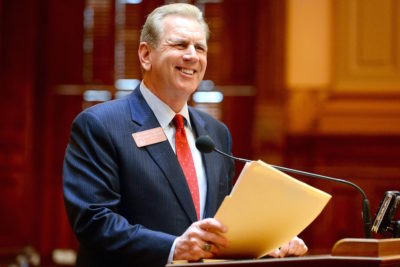
Lawmakers finance priorities as they near the end of their 40 day session
On Monday, March 5, the House reconvened for Legislative Day 30 and the ninth week of the 2018 legislative session. Since we’ve now passed the Cross Over Day deadline, much of our work was accomplished in committee hearings where we reviewed Senate bills. In addition to the Senate bills in committees, we also voted on several pieces of legislation, including the Fiscal Year 2019 state budget, which is the most important bill that we pass every session.
State budget
The legislature is constitutionally required to pass a balanced budget each year, and we took a step in fulfilling this obligation on Friday, March 9, by passing House Bill 684, the Fiscal Year 2019 (FY 2019) budget. This year’s state budget with federal funds included is $50.85 billion and will guide our state’s spending from July 1, 2018, to June 30, 2019. The FY 2019 budget was determined by a revenue estimate of $26 billion, which is an increase of $1.03 billion, or 4.1 percent, over last year’s budget. The House Appropriations Committee carefully reviewed each portion of the budget and allocated dollars towards our state’s most pressing needs. There are many items, but I’d like to highlight some of the more significant allotments.
Rural development
As I’ve explained in previous columns, the House Rural Development Council’s (RDC) work during the summer and fall of 2017 has driven much of this year’s legislative agenda. The FY 2019 budget reflects a wide range of initiatives to assist our rural communities based on the RDC’s recommendations. Some of this rural funding is specifically aimed at boosting economic development in rural Georgia, including funding for the Department of Agriculture’s Georgia Grown marketing program; a downtown development attorney to help Georgia’s small towns secure redevelopment grants; a deputy commissioner of rural Georgia position; and the Center for Rural Prosperity and Innovations.
The budget also includes state dollars for several key rural health programs, including two rural surgical fellowships ; a statewide residency recruitment fair for rural medical facilities; insurance premium assistance for physicians who practice in underserved counties with one or less physicians; 10 regional Emergency Medical Services (EMS) training positions to train EMS personnel in rural Georgia; and the Rural Health Systems Innovation Center.
Additionally, the FY 2019 budget includes appropriations for various programs for rural Georgia’s children, such as funding for soft skills training and character education development for rural Georgia’s lowest performing schools; a mobile audiology clinic to provide audiological care to children in rural Georgia; and birth-to-five literacy and numeracy in rural Georgia. I am proud that the House has prioritized funds to support and revitalize our rural communities, and these allocations will help rural Georgia, as well as our state as a whole, to thrive.
Education
Each year, education funding is always one of the largest budget items in the state budget, and this year is no exception, with 55.9 percent of the entire budget allocated to education. First and foremost, the FY 2019 budget includes $119.5 million for K-12 enrollment growth and training and experience for an additional 6,552 students and 1,869 teachers across the state, and $361.7 million for the Teachers Retirement System (TRS) to support 117,957 retired and 218,193 active TRS members.
Additionally, the state budget allots $1.6 million for a student mental health awareness training program, including response and intervention training, for students in preschool through 12th grade.
Finally, but sadly, one of the most important education appropriations included in the budget was $8 million for school security grants to improve security in Georgia’s schools. This funding is instrumental in helping to protect Georgia’s students, teachers and staff members, and we hope that our Senate counterparts will join us in adding supplementary school security funding as well.
These are just a few of the many items designed to meet the wide ranging needs of our state.
Adoption reforms signed into law
Earlier in the week, I was pleased to join Governor Deal as he signed House Bill 159, one of the House’s most important bills this session, into law. HB 159 will significantly update and modernize Georgia’s adoption laws for the first time in nearly three decades, and this bill will streamline all types of adoptions.
The new adoption laws will increase efficiencies in every aspect of Georgia adoption, and these additions and revisions to our adoption code will bring Georgia up to speed with the rest of the country.
Our state’s updated adoption code will benefit every family going through the adoption process and every child in Georgia in need of adoption, and this groundbreaking legislation will go into effect on Sept. 1, 2018.
Contact me
With only eight legislative days remaining until adjournment , we are in the final stretch of the 2018 legislative session. It will be very busy, but you are always my top priority. Please feel free to reach out to me to voice any concerns, questions, or problems you might have. I can be reached at my Capitol office at 404-651-7737, or by email at [email protected]
Thank you for allowing me to serve as your Representative!
About the author: State Rep. Terry Rogers (R-Clarkesville) represents the 10th District of Georgia which includes portions of Habersham and White Counties. He serves as the Governor’s Floor Leader and Vice-Chair of the Appropriations Subcommittee, Economic Development & Tourism, and State Planning & Community Affairs Committees. Rep. Rogers also is a member of the Georgia House of Representatives’ Defense & Veterans Affairs, Human Relations & Aging, Regulated Industries, and Rules committees.





